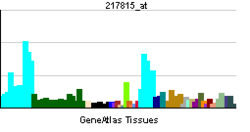SUPT16H
| Suppressor of Ty 16 homolog (S. cerevisiae) | |||||||||||||
|---|---|---|---|---|---|---|---|---|---|---|---|---|---|
| Identifiers | |||||||||||||
| Symbols | SUPT16H ; CDC68; FACTP140; SPT16/CDC68 | ||||||||||||
| External IDs | OMIM: 605012 MGI: 1890948 HomoloGene: 5207 GeneCards: SUPT16H Gene | ||||||||||||
| |||||||||||||
| RNA expression pattern | |||||||||||||
 | |||||||||||||
| More reference expression data | |||||||||||||
| Orthologs | |||||||||||||
| Species | Human | Mouse | |||||||||||
| Entrez | 11198 | 114741 | |||||||||||
| Ensembl | ENSG00000092201 | ENSMUSG00000035726 | |||||||||||
| UniProt | Q9Y5B9 | Q920B9 | |||||||||||
| RefSeq (mRNA) | NM_007192 | NM_033618 | |||||||||||
| RefSeq (protein) | NP_009123 | NP_291096 | |||||||||||
| Location (UCSC) | Chr 14: 21.82 – 21.85 Mb | Chr 14: 52.16 – 52.2 Mb | |||||||||||
| PubMed search | |||||||||||||
FACT complex subunit SPT16 is a protein that in humans is encoded by the SUPT16H gene.[1][2][3]
Function
Transcription of protein-coding genes can be reconstituted on naked DNA with only the general transcription factors and RNA polymerase II. However, this minimal system cannot transcribe DNA packaged into chromatin, indicating that accessory factors may facilitate access to DNA. One such factor, FACT (facilitates chromatin transcription), interacts specifically with histones H2A/H2B to effect nucleosome disassembly and transcription elongation. FACT is composed of an 80 kDa subunit and a 140 kDa subunit, the latter of which is the protein encoded by this gene.[3]
Interactions
SUPT16H has been shown to interact with BAZ1B.[4]
References
- ↑ Orphanides G, LeRoy G, Chang CH, Luse DS, Reinberg D (Mar 1998). "FACT, a factor that facilitates transcript elongation through nucleosomes". Cell 92 (1): 105–16. doi:10.1016/S0092-8674(00)80903-4. PMID 9489704.
- ↑ Keller DM, Zeng X, Wang Y, Zhang QH, Kapoor M, Shu H et al. (Mar 2001). "A DNA damage-induced p53 serine 392 kinase complex contains CK2, hSpt16, and SSRP1". Mol Cell 7 (2): 283–92. doi:10.1016/S1097-2765(01)00176-9. PMID 11239457.
- ↑ 3.0 3.1 "Entrez Gene: SUPT16H suppressor of Ty 16 homolog (S. cerevisiae)".
- ↑ Kitagawa H, Fujiki R, Yoshimura K, Mezaki Y, Uematsu Y, Matsui D et al. (Jun 2003). "The chromatin-remodeling complex WINAC targets a nuclear receptor to promoters and is impaired in Williams syndrome". Cell 113 (7): 905–17. doi:10.1016/S0092-8674(03)00436-7. PMID 12837248.
Further reading
- LeRoy G, Orphanides G, Lane WS, Reinberg D (1998). "Requirement of RSF and FACT for transcription of chromatin templates in vitro". Science 282 (5395): 1900–4. doi:10.1126/science.282.5395.1900. PMID 9836642.
- Orphanides G, Wu WH, Lane WS, Hampsey M, Reinberg D (1999). "The chromatin-specific transcription elongation factor FACT comprises human SPT16 and SSRP1 proteins". Nature 400 (6741): 284–8. doi:10.1038/22350. PMID 10421373.
- Kang SW, Kuzuhara T, Horikoshi M (2000). "Functional interaction of general transcription initiation factor TFIIE with general chromatin factor SPT16/CDC68". Genes Cells 5 (4): 251–63. doi:10.1046/j.1365-2443.2000.00323.x. PMID 10792464.
- Wada T, Orphanides G, Hasegawa J, Kim DK, Shima D, Yamaguchi Y et al. (2000). "FACT relieves DSIF/NELF-mediated inhibition of transcriptional elongation and reveals functional differences between P-TEFb and TFIIH". Mol. Cell 5 (6): 1067–72. doi:10.1016/S1097-2765(00)80272-5. PMID 10912001.
- Keller DM, Lu H (2003). "p53 serine 392 phosphorylation increases after UV through induction of the assembly of the CK2.hSPT16.SSRP1 complex". J. Biol. Chem. 277 (51): 50206–13. doi:10.1074/jbc.M209820200. PMID 12393879.
- Kitagawa H, Fujiki R, Yoshimura K, Mezaki Y, Uematsu Y, Matsui D et al. (2003). "The chromatin-remodeling complex WINAC targets a nuclear receptor to promoters and is impaired in Williams syndrome". Cell 113 (7): 905–17. doi:10.1016/S0092-8674(03)00436-7. PMID 12837248.
- Belotserkovskaya R, Oh S, Bondarenko VA, Orphanides G, Studitsky VM, Reinberg D (2003). "FACT facilitates transcription-dependent nucleosome alteration". Science 301 (5636): 1090–3. doi:10.1126/science.1085703. PMID 12934006.
- Li J, Hawkins IC, Harvey CD, Jennings JL, Link AJ, Patton JG (2003). "Regulation of Alternative Splicing by SRrp86 and Its Interacting Proteins". Mol. Cell. Biol. 23 (21): 7437–47. doi:10.1128/MCB.23.21.7437-7447.2003. PMC 207616. PMID 14559993.
- Tan BC, Lee SC (2004). "Nek9, a novel FACT-associated protein, modulates interphase progression". J. Biol. Chem. 279 (10): 9321–30. doi:10.1074/jbc.M311477200. PMID 14660563.
- Fryer CJ, White JB, Jones KA (2005). "Mastermind recruits CycC:CDK8 to phosphorylate the Notch ICD and coordinate activation with turnover". Mol. Cell 16 (4): 509–20. doi:10.1016/j.molcel.2004.10.014. PMID 15546612.
- Kouskouti A, Talianidis I (2005). "Histone modifications defining active genes persist after transcriptional and mitotic inactivation". EMBO J. 24 (2): 347–57. doi:10.1038/sj.emboj.7600516. PMC 545808. PMID 15616580.
- Huang JY, Chen WH, Chang YL, Wang HT, Chuang WT, Lee SC (2006). "Modulation of nucleosome-binding activity of FACT by poly(ADP-ribosyl)ation". Nucleic Acids Res. 34 (8): 2398–407. doi:10.1093/nar/gkl241. PMC 1458519. PMID 16682447.
- Pavri R, Zhu B, Li G, Trojer P, Mandal S, Shilatifard A et al. (2006). "Histone H2B monoubiquitination functions cooperatively with FACT to regulate elongation by RNA polymerase II". Cell 125 (4): 703–17. doi:10.1016/j.cell.2006.04.029. PMID 16713563.
- Tan BC, Chien CT, Hirose S, Lee SC (2006). "Functional cooperation between FACT and MCM helicase facilitates initiation of chromatin DNA replication". EMBO J. 25 (17): 3975–85. doi:10.1038/sj.emboj.7601271. PMC 1560368. PMID 16902406.
- Biswas D, Dutta-Biswas R, Mitra D, Shibata Y, Strahl BD, Formosa T et al. (2006). "Opposing roles for Set2 and yFACT in regulating TBP binding at promoters". EMBO J. 25 (19): 4479–89. doi:10.1038/sj.emboj.7601333. PMC 1589996. PMID 16977311.